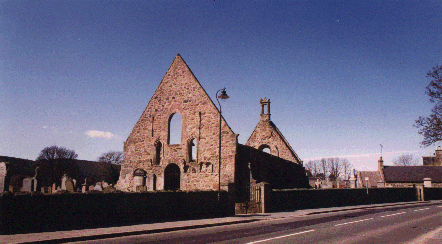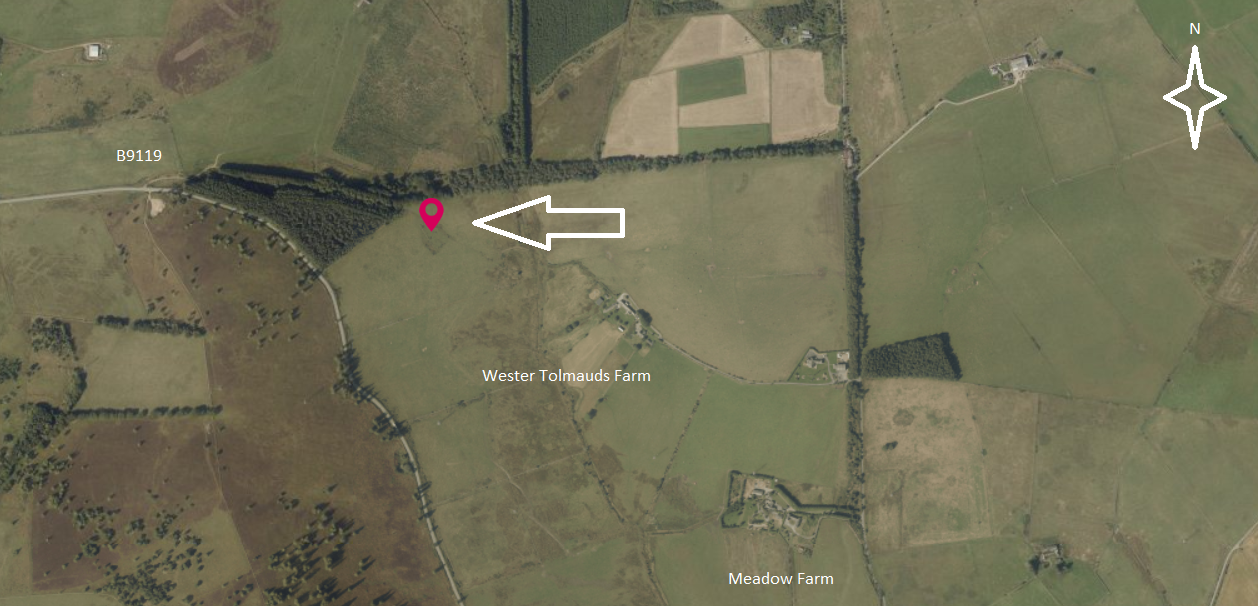St Erchard - a Pictish Saint of Deeside
As the damp morning mists roll down the valley of the Dee, keeping silent pace with the river's icy waters, it is easy to imagine the gentle chiming of a Saint’s bell and hear the distant echoes of some ancient chant glorifying the wonder of another dawn - giving thanks for the golden light of a new way of life for the Pictish peoples who thronged the glen.

Above: The old Parish Church of St Erchard
at Kincardine O'Neil.
Christianity came to Pictland of Alba many years before other parts of what we now call the British Isles. St Ninian and his disciples had converted large parts of Scotland before the erstwhile St Patrick had even arrived in Ireland. By a strange coincidence, St Columba, the great Colum Cille, ended his work in this world in the very same year that St Augustine landed in the south of England to begin converting the natives. It is little wonder that, throughout medieval times, the church in Alba was always granted an especially privileged place in the hearts and minds of successive popes. Alba can truly be thought of as one of the 'cradles of Christianity' in Northern Europe. Over the years, many Saints were to set out from our shores and embark on great missionary expeditions. Some sought the ultimate fate of the red martyrdom at the hands of some barbarian tribe, others the simple peace of a hermit’s cell and the fleeting company of wild animals.
On viewing the title I have used here, the minds of many local Aberdonians will pounce on the name of St Machar as being the obvious focus of my thinking - but they would be very wrong! The story of St Machar is best left for another day and another dram! Suffice it to say that the man, be he called Machar or Mochumma, may be a complete myth! No, here I seek to lay before you the name of another. A Saint who has a much surer foundation in our country's history, if this is at all possible when looking so far back into our ancient past! I wish to speak to you of a man who was born on Deeside and learned his doctrine from some of the greatest teachers of the time. A man who spent his life amongst his own people, the Picts; who could speak their tongue; who shared their folk-lore and, most importantly, had shared their hardships. No missionary from some foreign land was he and yet his name is so little known that one may think that it has been erased on purpose and hidden away from generations of Deesiders.
Have I whetted your appetite? Well, I hope so, for it is to our disgrace that we have kept his identity a secret for so long. The man is Erchard. None the wiser? Well, you would be if you came from Kincardine O'Neil!
St Erchard, it is said, was born in the Pictish settlement whose remains are still to be seen on the hillside above Tolmauds, about four miles to the north of Kincardine O'Neil (or Kinker as the locals know it).

Above: Aerial photograph showing St Erchard's birthplace at Wester Tolmauds. (NGR: NJ 5774 0722)
Erchard or M’erchaid as he is also called by early chroniclers (your imagination may be kindled here by the similarity between the Gaidhealic form of his name and Machar!), became a student of St Ternan at the banchor which, of course, we now know as Banchory Ternan on the north bank of the River Dee. The term banchor was used to denote a Christian settlement where was to be found a seat of learning and instruction. It is the same root from which the city of Bangor, in Ireland, derives its name. Erchard was destined to become a powerful spiritual force in the valley of the Dee and further west beyond Loch Ness, becoming one of Ternan's greatest disciples. In the course of time St Ternan ordained him and M'erchaid resolved to devote himself to continuing the work of that ancient father of Christianity in Alba – St Ninian.
M'erchaid is said to have founded the original church at Kincardine O'Neil over which the ruins of the medieval church now stand. As was the custom, this church was, from ancient times, known by the name of its founder. (It was only later, when the church in Alba became Romanised, that dedications became strictly biblical, often at the expense of the more ancient dedications!) Close by, on the other side of the road from the church, the reader can still see St Erchard's Well. Lately, the local residents have started to revive the memory of this man - who should be hailed as one of the heroes of the Early Church - and to celebrate his festival each year on the 24th of August.
But M'erchaid was not destined to stay on Deeside. He, along with another of Ternan's great disciples, St Drostan, followed literally in the footsteps of St Ninian. Heading northwards they came, via the muinnitir at Clova (close to Lumsden), to that other early community at Dunmeath (Glass).
Whilst in
Strathglass he discovered a bell hidden in the ground at the foot
of a certain tree. He resolved to end his wanderings and found
his church at the place where the bell rang for the third
time of its own accord. Following Ninian's route he eventually
came to Glenmoriston on the banks of Loch Ness and here the bell
rang for the first time at Suidh Mhercheird, St
M'erchaid's Seat. The second time, it rang at Fuaran
Mhercheird, St M'erchaid's Well at Ballintombuie
keep ye my sufferings deep in your remembrance;
and see that ye do not for a wager (or trial) place this bell in a pool to swim."
St M'erchaid is said to have carried out his missionary work in the fifth century, a long time before Colum Cille ever set foot on the soil of Alba. Being a disciple of St Ternan, Erchard must be counted as one of the earliest missionaries to work amongst the Picts. His work would seem to represent the re-kindling of the Christian fire lit by St Ninian in the northern parts of Alba. It is also interesting to note that M'erchaid travelled to the Great Glen, which was, in ancient times, known as the Valley of the Saints, which is the supposed route taken by Ninian on his return to Whithorn. More important, perhaps, is the fact that he carried out his mission near the ancient capital of the northern Picts at Craig Phadrig. This fortress is now thought to have been situated on the hill of the name above Inverness although the Hill of Torrean is thought by some to be a better candidate and still within the bounds of Inverness. A minority claim the Pictish capital was situated at Urquhart where the ruins of a much later castle now stand. Interestingly, some sources claim that one of the earliest buildings on this castle site was a chapel founded by Colum Cille himself. The truth, however, seems to be that the High King of the Picts moved his capital between a number of locations, including another at Loch Insh near Kingussie. It can be argued with certainty that M'erchaid based himself very much on the "main road", as it were, from north to south and that his mission must have had a huge influence on the Pictish nation. The fact that M'erchaid was a Pict himself and understood their language would have been a huge advantage and would have added greatly to his powers of conversion.
Some chronicles say that M'erchaid visited Rome and, when there, was made a bishop. We must beware of this facet of his history, however, since it was a very common practice of the Roman fabulists to tell us that a particular saint visited Rome. The story continues that, on his way home, M'erchaid remained for a time in Pictavia, now Poitou in France, and preached the Gospel to its inhabitants, some of whom had lapsed into paganism. Here again we encounter a fascinating parallel with the supposed history of St Machar as told in the Aberdeen Breviary. Machar, too, is said to have gone to Rome and to have been made a bishop. Indeed, he is said to have been made Archbishop of Tours which is itself in the northern part of Pictavia or Poitou. Is this similarity another coincidence or are we, in fact, starting on a trail which will determine Machar and M'erchaid to be one and the same person?
On his return journey, and when only a short distance from the district of Kincardine O'Neil, the saint felt that death was approaching. He commanded that his body should be placed in a cart drawn by a pair of horses, and that a church should be built on the spot where they halted. This, according to popular belief, was the origin of the church of Kincardine O'Neil; and it was natural that the saint should have been adopted as its titular.
Most of what we would suggest that we know about these very early times, and the activity of the first Saints, comes from legend and folk-lore. It is, as a result, open to question and considerable doubt. However, by piecing together the fragments which do remain, it may be possible to get a glimpse of the truth. What does seem to emerge is a story which may have at least one major consequence – that Erchard or M'erchaid should be placed amongst the ranks of the pioneering heroes of the early Pictish church in Alba, alongside the better known Ternan and Drostan. The deliberately misleading history contained in the Aberdeen Breviary may, in this case, be close to a truth, but it has confused Machar for M'erchaid. Here, indeed, is a mystery worthy of further investigation. For, if it is the truth, then Aberdonians have been mislead for many centuries into the veneration of Machar when, in fact, the target of their intercessions should have been M'erchaid. Can we doubt that there would have been a much more enthusiastic acceptance of a local man rather than an Irish foreigner? A man whose roots were very much in Deeside and a man whose impact on those times is clear and considerable!
The conclusion is for the reader to draw. For me, as I sit at home high amongst the freezing hills of Deeside, the memory of these early times, seen through the crystal amber of a "wee Tamdhu", and the simple warmth of another peat on the fire, seems all that I can hope for! But wait, is that a bell I hear outside ...!
1. HES "CANMORE" database accessed 18 October 2023.
small(transp).png)
